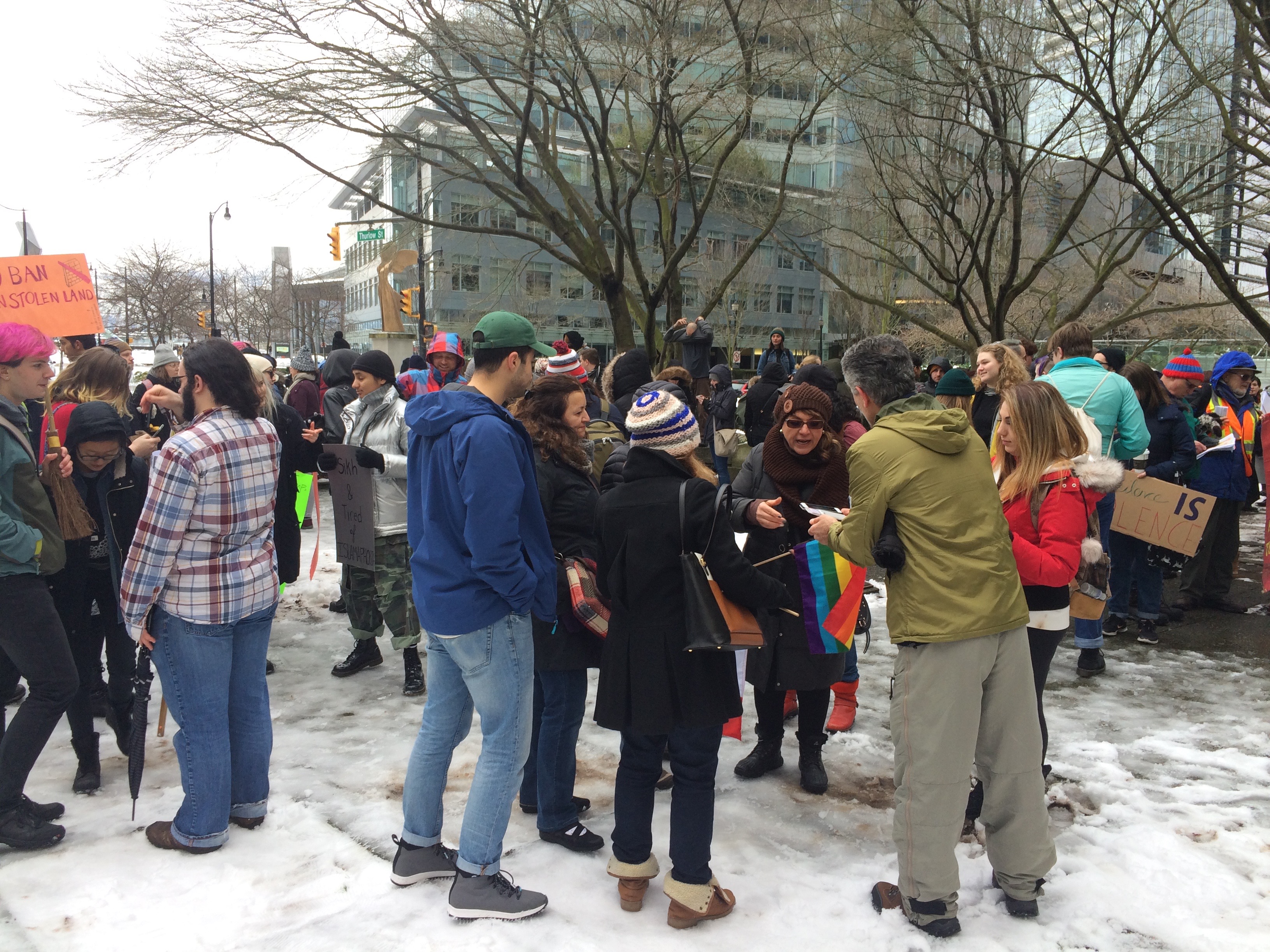Refusing Bordering Practices
This photo was taken on February 4th, 2017 at Portal Park in Vancouver across from the US consulate. The image shows the group of protesters who attended the event “Stand Against the Ban”. They brought many signs and posters, some of which read “No Ban, no wall, welcome one and welcome all”, “white silence is white violence”, and “No ban on stolen land”. The event was hosted by the UBC Social Justice Center, who held the protest as a form of action against the travel and refugee ban passed under the trump administration. Furthermore, they aligned themselves with Black Lives Matter- Toronto who demanded that the Canadian government must condemn the executive order, open the Canada-USA border, end racist, anti-refugee, anti-black, Islamophobic exclusion of migrants and refugees, and rescind all federal legislation that attacks racialized black and brown Muslims and refugees.
The protest began with an acknowledgement that the event was occurring on the occupied traditional, ancestral and unceded territories of the Coast Salish peoples. They mentioned that what was occurring within the US and Canada was on stolen land that was taken by force. By doing this they recognised the violent history of settler colonialism and imperialism that involved the dispossession and near extermination of indigenous peoples. Donald Trump and his government that is responsible for the travel and refugee ban preventing migrants from entering, are themselves descended from migrants who came without permission.
Within this white settler society, migration is only allowed when it is needed or beneficial and when migrants are not considered to be beneficial they are banned. For example transpacific migration, which has helped the Canadian economy and shaped many Canadian urban capitals. This relationship began with the migration of Chinese peoples to build the trans pacific railway, which improved the wealth of Canada, allowing the transportation of Chinese silk from Canada into high-end European markets (Yu, 2009). However, after the railway was completed the Chinese Head tax and the Chinese Immigration Act that were implemented acted as practices of bordering which prevented many from calling Canada their home and adjudicated belonging, further alienating those who were already within Canada’s borders. Later when Asian migrants were considered beneficial to the nation as a result of their wealth, the Canadian government initiated a business migration program in the 80’s (Yu, 2009). Race is often a factor in the practices of border control and as in this case Chinese and Asian migrants were racialized to the point where they were banned when they lost their “utility”.
The same colonial ideals that prevented the migration of the Chinese are currently preventing the migration of those from the middle east with Trump’s refugee and travel ban. The occupation of the middle east by the U.S. after the discovery of oil sands in the 1930’s, served to benefit the US economy and not many others. This has contributed to many conflicts between the US and middle eastern countries (Jones, 2012). Furthermore, it is easy to detect a pattern of inequality which provides power and only benefits the white settler society. For this reason, it doesn’t come as a surprise that Donald Trump has banned 7 countries situated in the middle east from entering the U.S., as it only serves American interests. The reasoning behind this decision is to protect American citizens from the possible violence and terrorist attacks that could be brought into their nation despite Islamic terrorist attacks being less common than attacks by white supremacists. Although Trump claims that this ban is not a Muslim ban, it has a section that allows Christians from these nations to enter the United States and is therefore highly connected to religion (Beauchamp 2017). Trump’s ban is creating a divided nation and does little to protect American citizens, instead ensuring that power remains with white heterosexual men.
Works cited:
Beauchamp, Z. (2017, January 28). Trump says his refugee ban is about protecting America. It’s really about Islamophobia. Retrieved from http://www.vox.com/world/2017/1/28/14424940/trump-refugee-ban-muslims-islamophobia
Jones, T. C. (2012). America, Oil, and War in the Middle East.The Journal of American History,99(1), 208-218. doi:https://doi.org/10.1093/jahist/jas045
Yu, H. (2009). Global migrants and the new Pacific Canada. International Journal, 64(4): 1011-1026.
